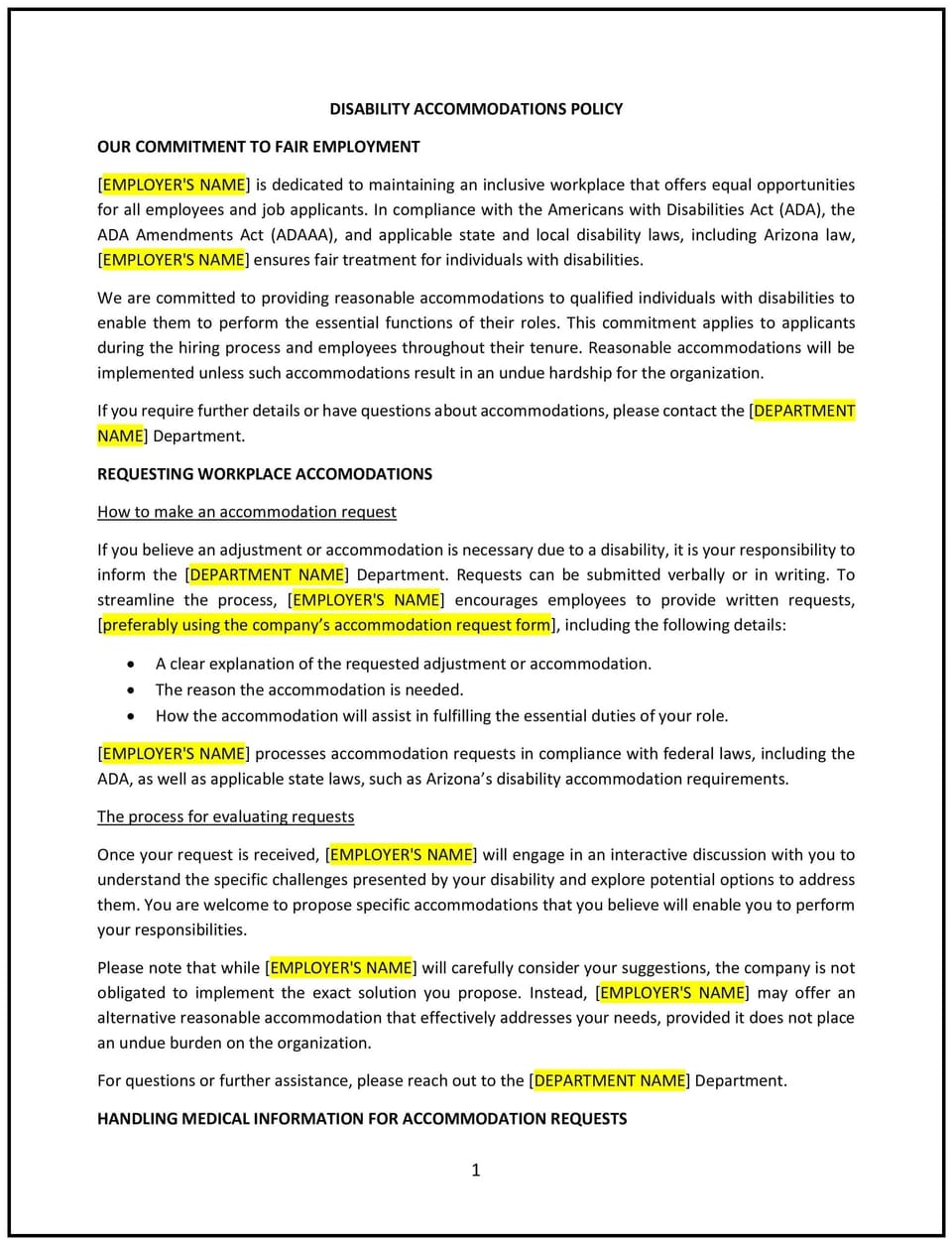Disability accommodations policy (Arizona): Free template

Disability accommodations policy (Arizona)
In Arizona, a disability accommodations policy ensures businesses comply with the Americans with Disabilities Act (ADA) and Arizona-specific regulations by providing reasonable accommodations to employees with disabilities. This policy fosters inclusivity, supports employee well-being, and helps businesses maintain a fair and compliant workplace.
This policy outlines the procedures for requesting accommodations, the employer’s responsibilities, and the process for evaluating and implementing reasonable adjustments. By implementing this policy, Arizona businesses can support equal opportunities for all employees while reducing legal risks.
How to use this disability accommodations policy (Arizona)
- Define reasonable accommodations: Provide examples of accommodations, such as modified workstations, flexible schedules, or assistive technology, tailored to employee needs.
- Establish a request process: Outline how employees can request accommodations, including the documentation required to support their requests.
- Include an evaluation procedure: Detail how the business will assess each request to determine feasibility and compliance with legal obligations.
- Ensure confidentiality: Specify that employee medical information and accommodation requests will be handled discreetly and securely.
- Monitor and review: Encourage regular feedback from employees to ensure accommodations remain effective and appropriate.
Benefits of using a disability accommodations policy (Arizona)
This policy offers key advantages for Arizona businesses:
- Supports compliance: Ensures alignment with federal ADA requirements and Arizona labor laws, reducing the risk of legal disputes.
- Promotes inclusivity: Fosters a diverse and supportive workplace culture where employees feel valued and respected.
- Enhances productivity: Provides employees with the tools and adjustments they need to perform effectively in their roles.
- Reduces turnover: Demonstrates a commitment to employee well-being, improving morale and retention.
- Protects reputation: Positions the business as an equal opportunity employer, attracting talent and strengthening community trust.
Tips for using a disability accommodations policy (Arizona)
- Address Arizona-specific considerations: Include provisions for industries prevalent in Arizona, such as healthcare or hospitality, where accommodations may differ.
- Train supervisors: Educate managers on recognizing accommodation needs and responding appropriately to requests.
- Use consistent evaluation criteria: Apply uniform standards to assess accommodation requests, ensuring fairness and legal compliance.
- Document all actions: Maintain records of requests, evaluations, and implemented accommodations for transparency and audit purposes.
- Regularly update the policy: Reflect changes in laws or workplace needs to ensure continued relevance and effectiveness.
Q: What are examples of reasonable accommodations under this policy?
A: Examples include modified work schedules, ergonomic equipment, wheelchair-accessible workspaces, or assistive technology, tailored to the employee’s needs and role.
Q: How can employees request accommodations?
A: Employees should submit a formal request to HR or their manager, along with any required documentation, such as a medical note supporting the need for accommodations.
Q: What is the employer’s responsibility when evaluating accommodation requests?
A: Employers must assess requests promptly and fairly, determining whether the accommodation is reasonable and does not impose undue hardship on the business.
Q: How does this policy support compliance with Arizona laws?
A: By aligning with ADA guidelines and state-specific regulations, the policy helps businesses provide accommodations that meet legal requirements.
Q: How should businesses handle confidential medical information?
Q: How should businesses handle confidential medical information?
This article contains general legal information and does not contain legal advice. Cobrief is not a law firm or a substitute for an attorney or law firm. The law is complex and changes often. For legal advice, please ask a lawyer.


